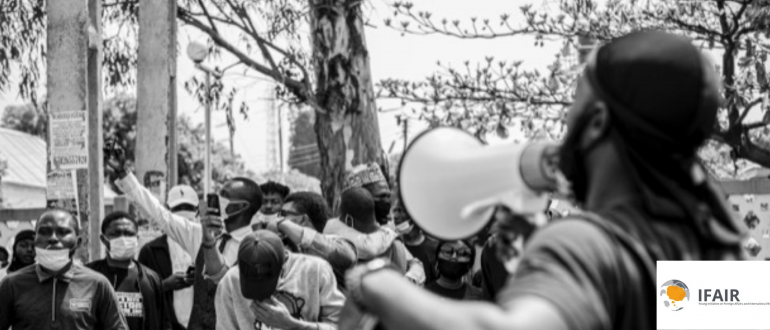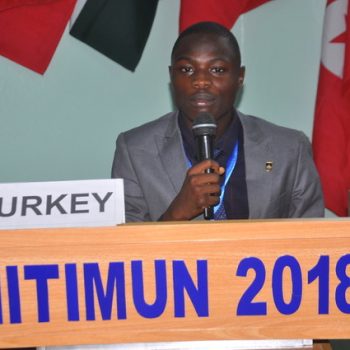
Which role for the Nigerian youth in the emergence of a New Nigeria?
Disclaimer: The views and opinions expressed in this article are those of the author and do not necessarily reflect the opinion of IFAIR e.V. or its members.
When Nigeria gained independence from the British colonial government in 1960, joy in the faces of Nigerians witnessing the celebration had no bound as there were great expectations heralding the event. But alas! More than 60 years later, the country’s sickening situation has cast a shadow for its future. Moving further, we have two options as we seek to address the challenges bedeviling this blessed country. On one hand, it is managing a condition where corruption, insecurity, poverty, and injustice are the order of the day. On the other end, a new course for a new Nigeria where justice, peace, progress, national development become the order of the day is needed. This can only be championed by energetic, passionate youth who are hungry for improvement and progress.
According to the UN, the global youth population(between the ages 15 and 24 years) is estimated at 1.8 Billion which is 19% of the world population1. Africa’s population of young people is the highest share across the globe with Nigeria as the highest on the continent. Of utmost importance to building a better and new Nigeria is the need for young people to explore the political space of the country. Young people have innovative ideas that are useful assets to national development and as such, there is a need for them to get involved in the political process.
The National Youth Service Corps is an initiative that best explains how Nigerians have played significant roles in community development. Established during the Gowon administration in 1973 with the aim of fostering national unity and integration, the scheme requires university graduates to serve a period of one year where they are posted to various communities to play significant roles in community development. In addition, they are exposed to various career opportunities for that period. The scheme has strongly created an avenue for Nigerian youth to demonstrate their productiveness in various dimensions such as community service, election processes, youth advocacy, entrepreneurial development and poverty alleviation. 49 years after its creation, the scorecard of Nigerian youth under the scheme has proven their productivity and innovative ideas towards nation-building.
The recent #Endsars protests that broke out in October 2020 were a historic juncture led by the Nigerian Youth to resist police brutality, harassment, and extortion. The protest was a movement that soon took over social media with the hashtag #EndSARS with up to 28 Million posts on Twitter by prominent actors from across the globe who showed solidarity with the protest against the status quo. Consequently, Nigerian authorities were forced to disband the police unit Furthermore SARS was accused of various degrees of atrocities against the affected victims after the initial protest started. A year on, the Nigerian government has started to embrace initiatives to compensate the families of the victims affected. Additionally, the state governments across the country’s 36 states started to collect detailed information on the atrocities committed by the police forces to assure the masses of their determination to seek justice.
This is a strong illustration that the young people can be a strong agent of national development in the emergence of a new and better Nigeria provided that they are ready to play an active role in developing the country.
Young people also have a key responsibility to play in building a peaceful and safe Nigeria because the young people across the globe are key stakeholders in peacebuilding. According to a recent study carried out by Mercy Corps, many active members of terrorist groups, most especially in the West African region, willfully joined or were forcefully conscripted from the large pool of unemployed youth2. The Nigerian youth must thus seek to contribute to building a peaceful nation by embracing peaceful coexistence across divides.
In addition, the young people must learn to deploy their knowledge in addressing the challenges bedeviling the nation through effective means such as national dialogue. Dialogue remains a key tool in peacebuilding and as such, there is a need for the voices of the young people to be heard from the local to national levels by giving them the chance to express their grievances.
Going further, without any doubt, young people across the globe have an extensive network within their various communities, and the fluency with which they use social media to disseminate their messages are unique assets to the promotion of love, tolerance, national development across the globe. Social media, if properly deployed, can be used to help spread peace, encourage dialogue, sensitize young people across all divides, religions, ethnic groups, political affiliations. The Nigerian youth must collectively deploy social media to promote values that can strengthen national unity.
In conclusion, young people represent not only the key stakeholders in national development but also a key risk factor if they are not properly harnessed. Hence, to build a new Nigeria, young people are the key pillars that the country depends on. Young people must also learn to use national dialogue in resolving issues and differences when the need arises. The Nigerian youth cannot afford to disappoint.
The National Youths Development Policy asserts that:
“Youths are the foundation of a society. Their energies, inventiveness, character, and orientation define the pace of development and security of a nation. Through their creative talents and labor power, a nation makes giant strides in economic development and socio-political attainments. In their dreams and hopes, a nation founds her motivation; on their energies, she builds her vitality and purpose. And because of their dreams and aspirations, the future of a nation is assured.”4
References
- United Nations, UN Office of the Special Adviser on Africa (OSAA). 2019. https://www.un.org/en/Africa/peace/.youth.shtml.
- Mercy Corps. 2016. “Motivation and Empty Promises: Voices of Former Boko Haram Combatants and Nigerian Youth.” https://www.mercycorps.org/research-resources/boko-haram-nigerian
- The African Union. 2020. “A Study on the Roles and Contribution of Youth to Peace and Security in Africa.” https://www.peaceau.org/en/article/a-study-on-the-roles-and-contributions-of-youth-to-peace-and-security-in-africa
- Second National Youth Policy Document of the Federal Republic of Nigeria. 2009. https://www.youthpolicy.org/national/Nigeria_2009_National_Youth_Policy.pdf

Tufayl Adelakun
Tufayl Olamilekan Adelakun is a recent graduate of History and International Studies at Lagos State University. He recently entered the National Youth Service Scheme at the National Commission for Museum and Monuments in Jos. He seeks to build his career interest in research and diplomacy and strives to become a diplomat in Nigeria.
